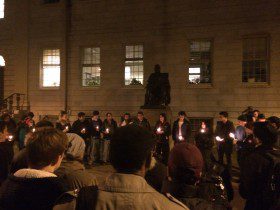This blog post originally appeared on Fernando Reimers’ blog.

Members of the Harvard community gathered on Tuesday night, Dec. 16, for a vigil on Harvard Yard in honor of the victims of the Peshawar attack.
By Fernando M. Reimers, Ford Foundation Professor of International Education, Director, International Education Policy Program, Harvard Graduate School of Education; SAI Steering Committee member
I awoke this morning to the painful news that seven cowards had entered a school in Peshawar, in Northern Pakistan, where they had murdered 132 students and 9 teachers and staff. My heart goes out to their families and friends. I share the pain of those, still in disbelief, that anyone would intentionally target civilians not engaged in combat, in a school, with the deliberate intent of killing them.
A group has claimed responsibility for the attacks, in the name of the Taliban, as an act of war against the Pakistan military. Only they, in a world of delusion, think there is a justification for this gruesome act. No one else in the world shares their view of reality, not in Peshawar, not in Pakistan, not in the world. The assassins who conceived that it was fair game to assassinate hundreds of teenagers and their teachers to achieve some goal are alone in their thinking, they lack reason and soul. I can only imagine the grief of their mothers, of their spouses, of their families, in realizing how far the deep end of reason and reality these thugs have fallen. How their cowardice has robbed them of any sense of identification with country, with religion, with family. These murderers, and anyone else who enabled their crime, have no soul, they don’t belong in this planet, they are not recognizable as members of the human species.
In their madness, these seven criminals targeted students and teachers in a school, a place where together they worked to advance understanding, to gain the knowledge and the dispositions to better understand the world and to improve it. This crime was committed in a house of light and of love.
It was in response to the atrocities committed by other murderers during World War II that those who crafted the Universal Declaration of Human Rights included education as one of the basic rights we should, together, work to provide every person on the planet. The hope was simple, in educating all we would create the conditions for sustainable peace in the world. The hope was grounded in the understanding that education can cultivate the capacities that help a person understand another, and help us bridge divides, find ways to work together to improve the world.
This is the reason governments and ordinary citizens have collaborated over the last seventy years producing one of the most dramatic transformations in the history of humanity. A transformation that has provided most children in the world the opportunity to go to school. This work is unfinished, the Secretary General of the UN Ban Ki-moon, has proposed even bolder aspirations for this global movement, the education of global citizens, of people who can understand the world in which they leave, our shared global challenges, our interdependence, an education that can prepare us to collaborate with others in eliminating poverty, reverting climate change, resolving conflicts.
The seven criminals who killed students and teachers did not have the soul to understand how their own humanity binds them to the humanity of others. They could not comprehend how they could make common cause with other humans in addressing the challenges of the world. They were alone in the most despaired of solitudes, of those who have lost all ties to other members of the human race. Whatever schooling these thugs had received, it had failed them. They feared education, teachers, and the empowerment that it produced for students.
With their horrific acts, however, these cowards have shed a light on the importance of the ongoing work of teachers and of those who support them, they have made evident that teachers who endeavor to educate in places where thugs like these fear them, is an act of love and courage. This cowardly act underscores the importance, indeed the urgency, of the cause of education for all which activists like Malala Yousafzai advance, the courage of her father who created a school so her daughter and others could gain an education that liberated them from the shackles of prejudice and intolerance, it underscores the importance of the work of teachers all over Pakistan, or public servants who advance the work of schools, of ordinary citizens who support their work, of international development and charitable organizations who advance the universal right of education.
Today, as I grieve the 141 dead, I salute them in their dedication to teaching and learning, I salute them in their love and in their courage, and appreciate even more all others who continue to advance the goal of providing all children an education that helps them become fully human, as they recognize the ties that bind them together with the rest of humanity, above all differences. I invite you to join me in supporting, in whatever way is within your means, those who do this work of love and courage.
Read more:
Taking a Lesson From Malala (Huffington Post) by Fernando Reimers
Can We Learn to Get Along? (Huffington Post) by Fernando Reimers
